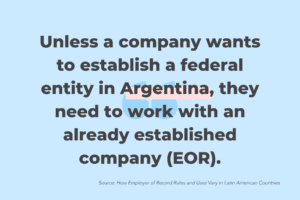
The use of Employer of Record in Latin America
The use of employer of record in Latin American countries is on the rise.
As discussed in previous blog posts, there is a growing amount of companies outsourcing their tech needs, software development, and engineering to Latin America. Whether they are new to the idea of nearshoring, or moving their operations out of Asia or Eastern Europe because they are tired of dealing with the time zone difference, businesses all over North America are utilizing the incredible talent available in Central and South America.
With the rise of nearshoring, many companies have turned to an Employer of Record to help them establish their remote work team.
Brief overview of EOR
An Employer of Record (EOR) is different from a staffing agency or payroll partner in that the remote team is, at least on paper, employed by the EOR. The EOR takes on all risk and liability, as well as manages HR, payroll, benefits, and taxes.
Remote tech teams, in practice, are still working for the company that hired the Employer of Record, but the EOR has more responsibility. Many companies prefer this to a payroll service since they don’t want to get in trouble later for labor violations and carry the risk of non-compliance.
Though most Latin American countries allow Employers of Records to operate, there are unique differences between the countries. Before a company starts down the path of using an Employer of Record to establish a remote team of developers and engineers, it’s important to weigh the pros and cons of each country.
How Does EOR work in:
Argentina
Argentina’s tech scene is thriving in many ways and the home of a number of remote coding teams. As U.S. businesses have started to establish a presence in Argentina, many have found EOR a helpful solution to get started quickly.
Availability of EOR:
Employer of Record is an option in Argentina.
EOR is one of two ways a company can build a remote workforce in Argentina. Unless a company wants to establish a federal entity in the country, they have to work with a company that already has an established identity in the country to perform payroll, HR, taxes, as well as manage benefits.
Ease of EOR:
Since establishing employment in Argentina is fairly easy, it is pretty seamless for companies wanting to work with an EOR to establish a remote team. As long as the EOR understands the tax and labor laws set forth by the Argentine Constitution and the Ministry of Labor, it is easy to use EOR in Argentina.
Working hours:
According to the MInistry of Labor, employees may not work more than 48 hours in a week (8-9 hours per day, no more than 6 days a week). Employers must pay overtime at 50% of hourly salary and 100% on national holidays.
At least 12 hours of rest must be taken between working days.
Compensation and bonuses:
There is a national minimum wage of 31,104 Argentine pesos ($316.51) a month and mandatory bonuses are expected to be paid twice a year of half of the highest monthly salary.
Termination and severance:
Under Argentinian law, employees can be terminated with or without just cause.
Maternity and sick leave:
Argentina requires 90 days paid maternity leave (45 before and after the birth), though more can be negotiated with the employer.
Employees working under 5 years are entitled to 3 months paid sick leave. Employees with more than 5 years of continuous employment are entitled to 6 months of paid leave.
Vacation and holidays:
There are 12 official paid holidays in Argentina.
Workers are guaranteed at least 14 days vacation, a number that goes up depending on the seniority of the employee.
Health coverage:
Employers must provide health coverage through the labor union.
Pension/Social Security:
Employers must pay into the employee’s social security.
Brazil
Availability of EOR:
Through a co-employment model, companies can work with Professional Employer Organizations to establish an Employer of Record in Brazil to manage payroll, HR, taxes and compliance on behalf of the employer.
Ease of EOR:
To establish an EOR, a company is required to do quite a bit of paperwork and registration, since the EOR is technically a co-employer. Although possible, it is not as easy to establish an EOR in Brazil.
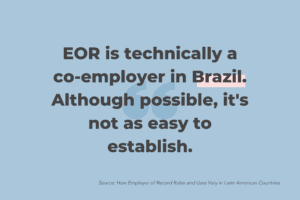
Working hours:
The Federal Constitution states that a worker should not work more than 44 hours per week.
Compensation and bonuses:
Brazilian minimum wage is R$1100 per month ($197 US dollars).
There is also a required “13th salary” of an extra month’s salary paid between November and December.
Termination and severance:
For termination without cause, employers must provide 30 days notice with an additional 3 days notice for each year of employment (up to 90 days).
Severance is required for termination without cause of 8% of total compensation plus 40% of the severance pay fund.
Maternity and sick leave:
Mothers may take up to 120 days paid maternity leave, with the option of 2 additional months unpaid.
An employer pays the first 15 days of sick leave and social security covers the rest. Documentation of the illness is required to receive compensation.
Vacation and holidays:
For every 12 months of employment, employees are given 30 days of paid vacation, plus an additional third of the monthly salary as vacation pay.
There are 9 paid holidays.
Health coverage:
Employees are covered by the Sistema Único de Saúde (SUS), Brazil’s national public health coverage.
Pension/Social Security:
Employers are required to pay between 8 and 26.7% of their employee’s salary to the national social security.
Colombia
Availability of EOR:
Use of Employee of Record is available in Colombia. However, due to significant labor laws, the EOR needs to be qualified and actually have a presence and working knowledge in Colombia.
Ease of EOR:
The challenge with engaging with an EOR in Colombia is the vetting process. Colombian labor laws are written to favor the workers, so the EOR needs to really understand the specifics of the law. Once the right EOR is found, it is easy to get up and going with them.
Working hours:
Workers are not allowed to work over 48 hours per week without overtime compensation.
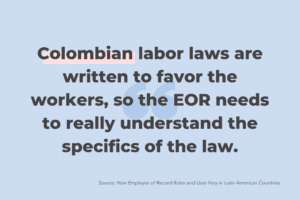
Compensation and bonuses:
Minimum wage in Colombia is COP908,526 per month ($240.74).
There are no required bonuses.
Termination and severance:
Employers may terminate employment with or without cause.
Employees are entitled to a month’s salary for every year employed as severance.
Maternity and sick leave:
Mothers get 18 weeks of paid maternity leave.
Employers are obligated to pay ⅔ of the salary for the first three days of illness. Social security pays for the days missed beyond that up to 180 days.
Vacation and holidays:
Once employed for a year, employees receive 15 days of paid sick leave, a number that increases with seniority.
Health coverage:
All employees are covered by Colombia’s national health system.
Pension/Social Security:
The majority of employee benefits come through a robust social security system. Employers are required to pay into each employee’s social security based on a sliding scale determined by income.
Costa Rica
Availability of EOR:
Costa Rica requires all companies employing citizens to be registered with the national business registry, which means that a company needs to either use an EOR or apply to be a federal entity.
Ease of EOR:
It is easy to work with an EOR in Costa Rica as long as the EOR is an established and registered company in Costa Rica.
Working hours:
The maximum weekly working hours are 48 hours. Many employees work 8 hour days Monday through Friday, with a half day on Saturday.
Compensation and bonuses:
Minimum wage in Costa Rica is unique in that each profession has a minimum salary expectation. For most unskilled workers, the minimum salary is 316,964 Co
sta Rican Dollars (roughly $522 U.S. dollars).
Like Brazil, there is a required Christmas bonus, or “13th salary,” equalling the equivalent of a month’s pay for those who have worked all twelve months of the year.
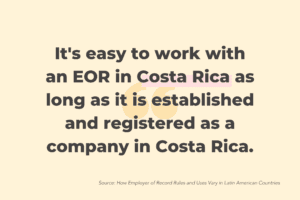
Termination and severance:
In the private sector, an employer can fire an employee without just cause.
For employees terminated without cause, employers are required to pay a month’s salary in severance for every year employed (up to 8 months severance).
Maternity and sick leave:
Mothers are entitled to one month paid maternity leave before the birth and three months after the birth. Employers are expected to pay 50% of the salary, while social security pays the other half.
For the first three days of illness, the employer pays 50% of the salary and social security pays the other 50%. After three days, social security pays up to 60% of the salary but the employer is not required to pay anything. The employee must provide documentation of the sickness to receive the benefits.
Vacation and holidays:
Employees are given at least 14 days paid vacation after one year of employment.
There are 9 paid national holidays.
Health coverage:
All employees are covered by Segur Social Costa Rica, the national health system.
Pension/Social Security:
Employers are required to pay into employee’s social security and pay 26.5%.
Mexico
Availability of EOR:
Due to a recent law passed in May of 2021, foreign companies may not use federally established companies as an Employer of Record. In essence, it is illegal to use and to be an Employer of Record in Mexico.
Ease of EOR:
Because of this law, companies either have to establish their own federal entity in Mexico or work with companies that are registered in both countries, like CodersLink. Because CodersLink is federally incorporated in both Mexico and the U.S., it can provide all the benefits of an EOR as a service, thus mitigating the recent law.
Working hours:
Mexico has a maximum of 48 hours of work per week, with some government jobs capped at 40 hours per week.
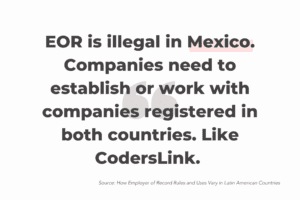
Compensation and bonuses:
Mexico has a daily minimum wage of 141.7 pesos per day ($7/day).
Employers are required to pay a Christmas bonus, called Aguinaldo, equal to 15 days’ pay. Some employers pay up to 20 days’ pay in the bonus.
Termination and severance:
Employers can terminate employees without cause, but are required to pay the equivalent of three months of daily aggregate salary plus 20 days salary for every year worked.
Maternity and sick leave:
Mothers are entitled to 6 weeks of paid leave before the birth and 6 weeks after the birth. Social security pays this, not the employer.
Sick pay is paid fully up to three days, and is paid at 60% by social security after the fourth day.
Vacation and holidays:
Employees are entitled to six days of paid vacation for the first year, with an increase of two days for every year of employment.
Health coverage:
All employees are covered by the Instituto Mexicano de Segur Social.
Pension/Social Security:
Employees are required to pay into their social security. However, there can be arrangements made between employee and employer for split contributions or higher than minimum contributions.
CodersLink
In looking at just five of the major Latin American countries with an established track record of outsourced tech talent, it is evident that there are significant differences in the ways companies can utilize Employers of Record to build a remote team.
Although it might seem overwhelming, the whole purpose of utilizing an EOR is so your company doesn’t have to learn all of the various ins and outs of a country’s labor and tax expectations. Regardless of where you are nearshoring, an Employer of Record will save you time and money up front to grow and build a remote tech team.
CodersLink specializes in helping companies build, operate, and transfer remote teams in Mexico through their special approach to Employer of Record. If you are ready to start building an incredible tech team in Mexico, reach out to us
